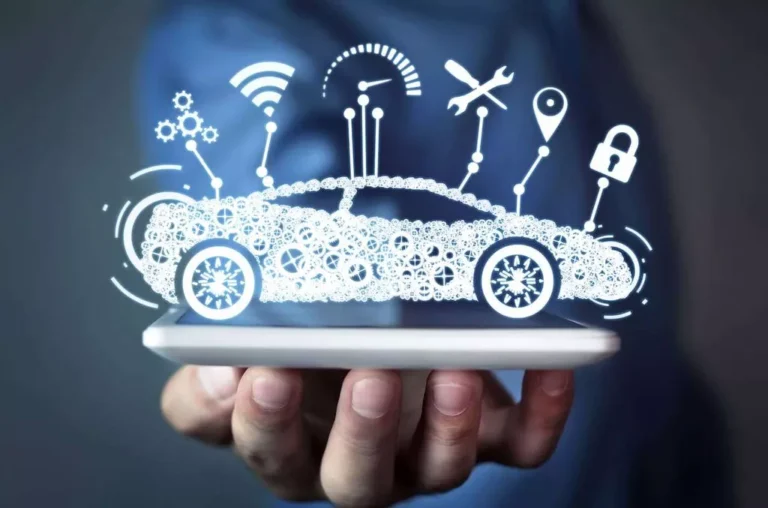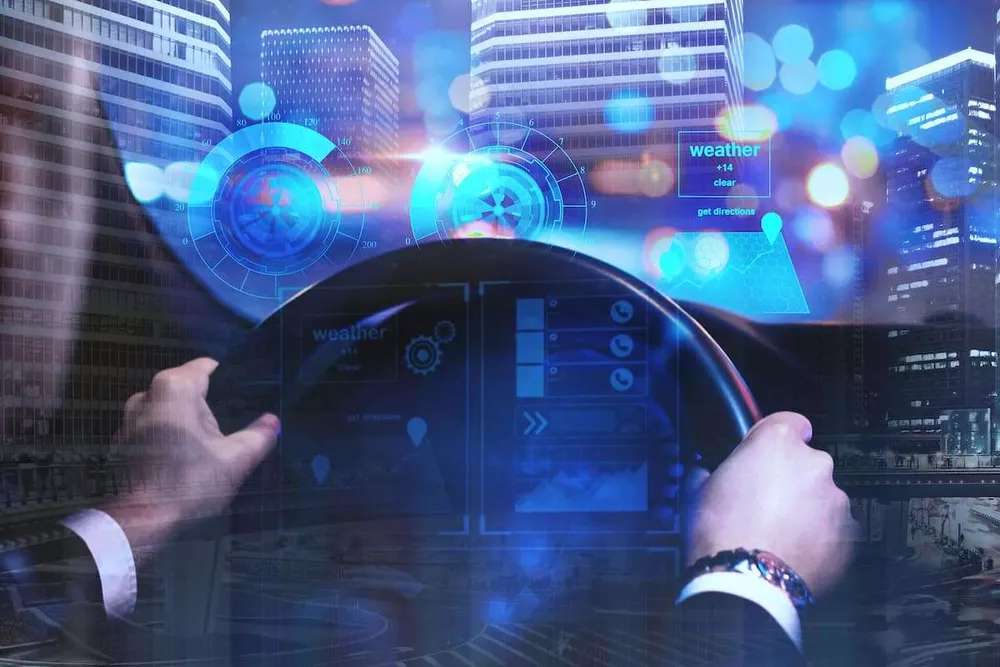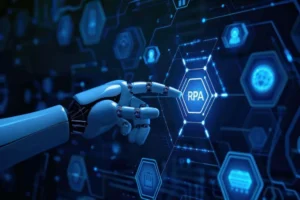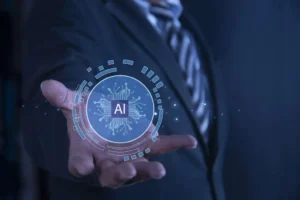Embracing Automotive Digital Transformation to Accelerate Innovation

The roads are about to get a lot smarter. In the automobile industry, the rise of the Internet of Things (IoT) and AI advancements pave the way for a future of digital transformation (DX). It encompasses various aspects — product design, automotive manufacturing, sales and marketing. We anticipate a significant rise in integrating digital technologies within automobiles in the coming years. In this article, we’ll look into automotive digital transformation and how it impacts the field.
What is Automotive Digital Transformation?
The latest study reveals that the global automotive sector leads in digital transformation spending. It projects investments of nearly $100 billion. Estimates surpass $238 billion annually by 2030 as the industry transitions from internal combustion powertrains to electric vehicle (EV) technology.
Like other industries, car companies focus on revamping their operations with a digital focus. They emphasize data utilization, seamless connectivity, and robust cybersecurity features. This shift promises various advantages, including enhanced productivity and visibility. What are the pivotal elements in facilitating this digitization process with AI in automotive industry? Internet of Things (IoT) in automotive industry, deep learning, and robotic process automation (RPA) take the center stage.
Digital technologies have ushered in a new era of proactive equipment monitoring. These advancements enable manufacturers to identify and address potential faults or errors before they disrupt production. It’s a prominent shift from reactive to preventive maintenance strategies. As a result, it became a cornerstone of DX within the digital car manufacturing sector.
In addition, DX is centered around getting the best out of analytics and artificial intelligence. This is what helps you optimize production planning. This way, you can easily prioritize quality improvements. Ultimately, it leads to informed decisions about resource allocation as well as demand forecasting. It ensures that you have the necessary resources to meet customer demands. Result? Optimized operations and a convincing competitive advantage in the market.
Let’s look at the top perks that automotive digital transformation brings to the table:
- Enhanced customer experience. Offering a distinctive experience is essential to maintaining customer loyalty and engagement. When you use digital tools and technologies, you explore avenues to meet client satisfaction. Some vehicles now feature built-in connectivity and infotainment systems that enhance the in-car experience of customers.
- Cost reduction. Manufacturers can increase revenue and reduce costs if they use digital solutions. To achieve this, you should use data about consumer preferences that AI can easily provide and summarize. It opens the door to a transformed business model and reduced payroll costs.
- Expansion of customer coverage. Seizing a wider audience is the main task of any company. How to do it? First, dealers should focus on attracting and satisfying customers. As an example, AI can help create engaging content for your online platforms that will help you stay on top of your customers’ minds.
The way car companies map out their future has undergone a dramatic shift. Gone are the days of traditional models. Instead, digital tools and visual data have become central players. The digital revolution spurred manufacturers to evolve. Fueled by the rise of artificial intelligence (AI) in automotive sector and innovative software, new car designs and models began to flood the market. The digitization of the automotive sector isn’t solely focused on enhancing efficiency. It empowers manufacturers to tap into their creativity and develop groundbreaking designs.
However, the digital wave doesn’t stop at the factory floor. The retail side of the industry embraced it, too. Car dealerships shifted gears — they showcase their inventory online and leverage email marketing to reach a wider audience. Many retail websites offer immersive experiences, like virtual car studios and 360-degree car photography. It’s set to captivate potential buyers.

We are confident that we have what it takes to help you get your platform from the idea throughout design and development phases, all the way to successful deployment in a production environment!
Why is Automotive Digital Transformation Important?
The automotive industry demands constant adaptation from manufacturers and service providers to meet evolving client expectations. To thrive in this world, you need to change. DX empowers companies to achieve three critical objectives:
- Align with customer demands and elevate the CX.
- Solidify their market position and establish a decisive competitive advantage.
- Propel themselves ahead of the competition.
The pressure is on for old-school auto giants like Daimler, Volkswagen, and Fiat. These established players are facing a new competition – disruptive innovators like Tesla. While Tesla might not be filling showrooms quite yet, their focus on digital innovation has skyrocketed their value.
Tesla’s unwavering commitment to technological advancement has propelled them to the pinnacle of the industry. The company boasted a market capitalization of $882 billion in March 2022. What is the way out for companies to avoid being left behind? Embrace automotive digital transformation and rethink your business models in the long run. Together with GlobalCloudTeam, you reevaluate your tech position and create something unique with the help of AI.

Examples of Digitalization in Vehicle Production
The digital revolution infiltrated every corner of car manufacturing. Let’s delve into some of the most widespread applications of digitalization in manufacturing:
- Machine Learning in Design: Machine learning (ML) in vehicle production generates multiple ideas within set parameters and tests them virtually. It accelerates innovation and ensures optimal performance.
- Robots on the Factory Floor: Advanced robots bring near-perfect precision and efficiency to car production. They handle tasks like welding, cutting, and assembly.
- Smart Manufacturing Software: Software like MES acts as the operation’s brain — it optimizes every production stage and enables swift problem-solving to get peak efficiency.
- Real-Time Transparency: Sensors, devices, and AI networks unlock real-time data across factories. The result? Optimized production, maintenance, and inventory.
- Predictive Problem-Solving: AI analyzes data to anticipate and address mechanical issues before they cause downtime.
Tech has changed how cars are created — it’s made them better and offers more choices to drivers. Moreover, we expect even more excellent features and customization in the future.
Use Cases of Digital Transformation in the Automotive Sector
Through digital transformation, various firms compete with established players in the automotive market. Let’s explore how you may employ modern tech to develop thriving businesses.
Autonomous vehicles & smart cars
The allure of self-driving cars is undeniable. Haven’t you imagined a world where traffic jams are a thing of the past? The vision is fueling a global surge in demand for autonomous cars. Now, the market value estimates reach $62 billion by 2026. These high-tech machines promise a futuristic level of comfort and convenience. Autonomous autos reduce human error, save lives, and even reduce travel time during peak hours by 40%.
Smart cars technology is all about AI, too. It’s essential to many activities, including autonomous driving algorithms, NLP for voice commands, predictive maintenance, and picture identification. AI gives the automobile the ability to learn from data and enhance performance over time.
Designing cars with AI
The past holds the key to the future, especially in car design. When designing next-generation automobiles, automakers use a wealth of data from earlier models. They may produce creative automotive designs by using AI to evaluate and optimize the data. AI plays the role of an effective design collaborator — it suggests improvements that enhance functionality and performance. It all facilitates the production process and eventually lowers costs.
Robotic manufacturing
Digital transformation revolutionizes manufacturing processes for enhanced efficiency and quality control. Robotics play a pivotal role in the shift. Globally, the automobile sector employs the greatest number of robots in its plants. RPA allows manufacturers to detect and rectify potential errors on the assembly line. The approach minimizes production delays and defects and prioritizes worker safety. Digital tools enable engineers to swiftly develop safer, more efficient solutions, saving time and resources.
AI chatbots
You may modernize your customer service strategy and streamline interactions with the power of AI-powered chatbots. These virtual assistants address client inquiries in real time. It improves response times and reduces the burden on your human support staff. Chatbots leverage advanced NLP to understand visitor requests. Ultimately, it enhances customer satisfaction and projects a forward-thinking and technologically sophisticated image for your business.
Conclusion
The digital revolution has ignited a wave of positive change in the global automotive market. Fueled by the digital transformation, the industry has shifted into high gear. It embraced vehicle production automation at an unprecedented pace. AI empowers companies to design and innovate with a newfound agility. From autonomous cars to intelligent virtual assistants — you can tap the power of AI, too. GlobalCloudTeam is here to help. Our team of AI experts offers you tailored solutions to fuel your automotive manufacturing business. Contact us today and find out how to revamp your firm.
Top Articles
RPA as a Service: Features of Robotic Process Automation Outsourcing
I am here to help you!
Explore the possibility to hire a dedicated R&D team that helps your company to scale product development.






